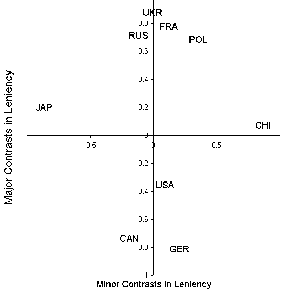
Evidence of block voting by judges at the 2002 Winter Olympics in Salt Lake City led to the awarding of Gold Medals to both a Russian and a Canadian pair. It also prompted calls for a fairer judging system that could monitor and correct for judge bias.
An enterprising science reporter for the Toronto, Canada, Globe and Mail, Stephen Strauss, contacted Marilyn Looney ("Figure Skating Fairness", RMT 10:2, p. 500). The result was a feature article on page F6, Feb. 16, 2002, with the headline: "New scoring system would have iced the gold for the Canadians."
It continued:
"It's the eternal question when it comes to skating competitions:
Can the bias of judges be detected and eliminated? Stephen Strauss
finds that something called the Rasch measurement may do the
trick."
Here are some Rasch-related excerpts:
"Looney reported that in a Rasch-adjusted universe second-place
winner [in 1994] American Nancy Kerrigan should have beaten out
Ukrainian Oksana Baiul for the gold medal."
"`The outcome could have been adjusted for judges' severity in real time after all the scores were in. We do it all the time in educational testing,' says Mary Lunz of Measurement Research Associates, a Chicago company that uses the Rasch approach in medical certifications."
"In answer to the question of what a Rasch-type analysis would have meant for the Salt Lake City Olympics, John Michael Linacre, a U.S. statistician who was Looney's consultant for the earlier work, has done a simple computation of the `prejudice pattern' at work in the judging. ... `You can see there is a block vote by four judges and it is also surprising to see that the Polish and the Ukrainian judges were more lenient on the Russians than their own skaters,' Linacre says. ... And what would a program that adjusted for human error -- either intended or accidental -- have produced in medal rankings? `Thought you would ask this. Yes, a Canadian victory,' says Linacre ... But maybe not, other statisticians say."
Perhaps the "other statisticians" are correct, but the Figure is a factor plot of bias patterns across the 9 judges, in which the Russian, Ukrainian, French and Polish judges share rating patterns, particularly contrasting to those of the Canadian and German judges. This plot, which Strauss saw, is the result of a preliminary analysis employing Facets, Winsteps and Systat. The major factor has a strength or eigenvalue of 3.8, the minor factor one of 1.7. In general, independent judging should not produce eigenvalues above about 1.4.

|
| Judge bias patterns (preliminary results) |
Since then, Marilyn Looney has been interviewed by reporters for newspapers, radio and TV. Other Rasch practitioners have also been contacted.
One reporter asked, "What can you conclude from these findings - that is, they don't `prove' collusion, right?" He's right. Statistical methods can't prove causality, but they can point out patterns and trends that merit close inspection, and can also indicate where and what remedial actions may be needed.
Further analysis, prompted by reporter questions, has revealed other bias patterns among the judges. The plot is thickening!
If you wish to do your own analysis, the complete set of judge ratings can be found at www.icecalc.com.
John M. Linacre
Judging Debacle in Pairs Figure Skating Linacre, J.M. … Rasch Measurement Transactions, 2002, 15:4 p. 839-840
| Forum | Rasch Measurement Forum to discuss any Rasch-related topic |
Go to Top of Page
Go to index of all Rasch Measurement Transactions
AERA members: Join the Rasch Measurement SIG and receive the printed version of RMT
Some back issues of RMT are available as bound volumes
Subscribe to Journal of Applied Measurement
Go to Institute for Objective Measurement Home Page. The Rasch Measurement SIG (AERA) thanks the Institute for Objective Measurement for inviting the publication of Rasch Measurement Transactions on the Institute's website, www.rasch.org.
| Coming Rasch-related Events | |
|---|---|
| Jan. 16 - Feb. 13, 2025, Fri.-Fri. | On-line workshop: Rasch Measurement - Core Topics (E. Smith, Winsteps), www.statistics.com |
| Apr. 8 - Apr. 11, 2026, Wed.-Sat. | National Council for Measurement in Education - Los Angeles, CA, ncme.org/events/2026-annual-meeting |
| Apr. 8 - Apr. 12, 2026, Wed.-Sun. | American Educational Research Association - Los Angeles, CA, www.aera.net/AERA2026 |
| May. 15 - June 12, 2026, Fri.-Fri. | On-line workshop: Rasch Measurement - Core Topics (E. Smith, Winsteps), www.statistics.com |
| June 19 - July 25, 2026, Fri.-Sat. | On-line workshop: Rasch Measurement - Further Topics (E. Smith, Winsteps), www.statistics.com |
The URL of this page is www.rasch.org/rmt/rmt154a.htm
Website: www.rasch.org/rmt/contents.htm